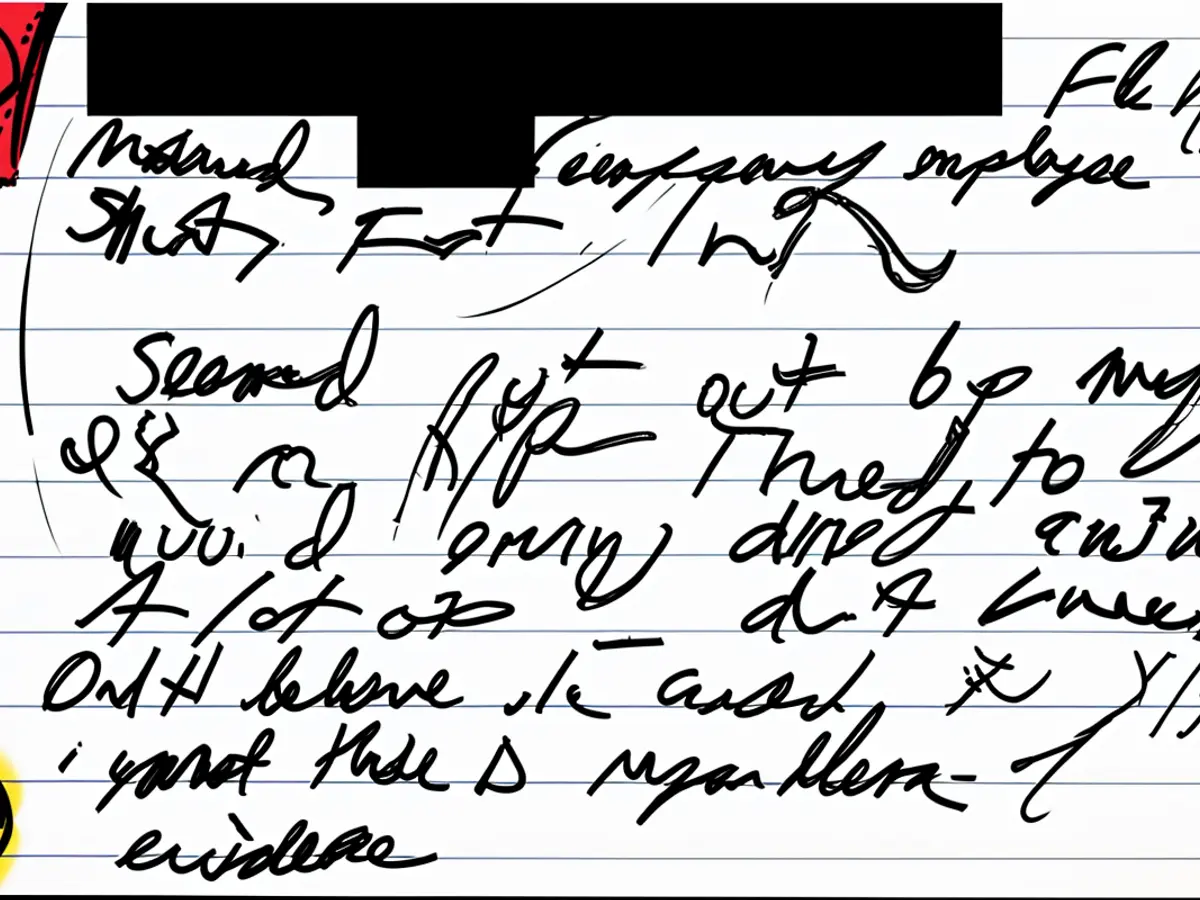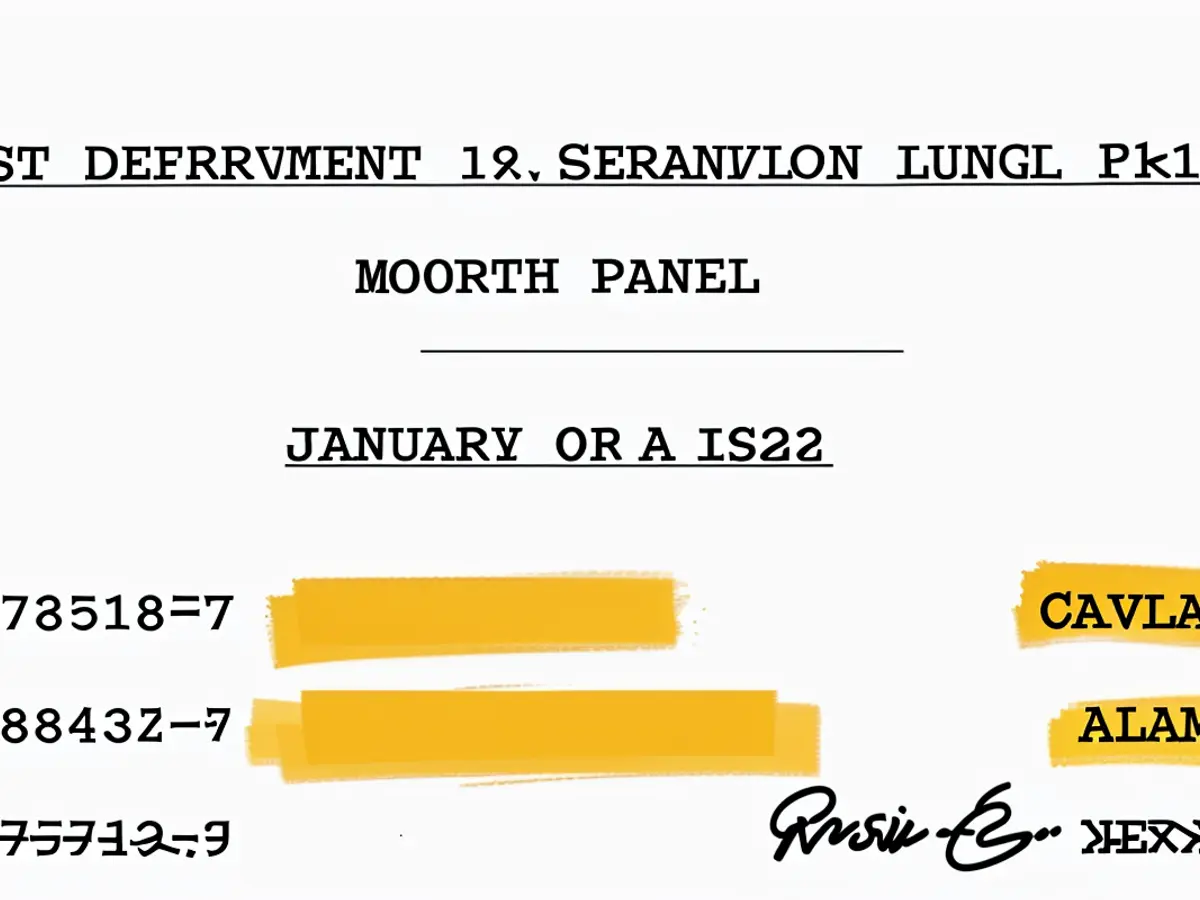Defendant, convicted of boy's murder, potentially freed due to prosecution's alleged racial jury profiling.
Lance was a cheerful, hilarious, affectionate, gentle lad, as stated by his siblings to CNN. His life was tragically cut short.
Dykes might soon be released due to a discovery made during the preparation of his appeal. An Alameda County deputy district attorney stumbled upon some old notes in trial records from the 1990s about potential jurors.
One potential juror in the Dykes case file was referred to as a "Compact, chunky ogre," and her race was noted, along with other Black potential jurors. The notes "FB" were written next to her name, possibly indicating her gender and race. "Must go" was written next to the name of a Black male, who was described as "MP." Another juror had the word "Jewish" underlined on their questionnaire. Further down, it was written: "I preferred him more than any other Jew. But no chance."
No Black or Jewish jurors were seated during the trial.
"When you have serious prosecutorial misconduct, it means that the conviction is an unjust conviction," said the current Alameda County District Attorney, Pamela Price. "And so, it's a matter of whether or not we can negotiate a resolution, or whether we need to go back to trial."
Brian Pomerantz, current counsel for Dykes, could only guess about the biases held by prosecutors towards certain groups. When asked about why they might have tried to exclude Black people from juries in death penalty cases, he said, "Black people typically have a negative perception of the police, so they are more likely to side with the defense." He added, "I believe that's a generalization that shouldn't be made."

Pomerantz also couldn't explain why prosecutors might not have wanted Jewish jurors. "There are different beliefs about Jewish jurors," he stated. "One theory is that they wouldn't be willing to sentence someone to a gas chamber, given the genocide of Jews during the Holocaust. Another idea was that they thought Jewish jurors were more liberal."
"A pattern of severe misconduct"
Federal Judge Vince Chhabria, who was assigned the appeal by Dykes last year, considers these notes to be proof of a larger issue.
"In earlier decades, prosecutors from this office were engaged in a pattern of severe misconduct – systematically excluding Jewish and African American jurors from death penalty cases," he wrote in a court order.
He has ordered the DA's office to review 35 cases from the mid-1980s to 2007. Among these cases are convicted mass shooters, serial killers, rapists, and murderers. Pomerantz has been going through those files as he works on cases for Dykes and other clients.

"In almost all the cases we've seen, there are lists like this," he stated, pointing to the letters 'MP' and 'FB' next to the names of potential jurors in numerous cases, involving defendants of various races. A misspelled offensive slur was used to describe a person in the jury pool. Pomerantz presented documents he says demonstrate that jurors were being racially profiled and struck as late as 2008. By law, prosecutors are not allowed to exclude jurors based on race, ethnicity, gender, or sexuality.
District Attorney Price, who assumed office last year, declined to comment on the claim of Dykes' release. Previously, she told CNN: "Mr. Dykes has spent 31 years in prison for that crime."
Pomerantz believes that some people who were sentenced to death may now be released. "For some, that may be the solution," he said. "And for some, that should be the solution."
Like Mark Schmeck, a client Pomerantz believes is innocent but was sentenced to death for the killing of Lorin Germaine during an armed robbery in the mid-1980s.
"He was a fun dad," Germaine's daughter, who wished to remain anonymous for safety reasons, told CNN. "He would take us fishing and camping... my mom worked night shifts, so he was the one at home at night... even he was the tooth fairy. I caught him once."

Schmeck claims his innocence in Germaine's death, and Pomerantz is petitioning for his release, arguing that he did not receive a fair trial. This concerns Germaine's daughter. "I don't know why," she said. "Just that someone who hurt my dad might be released, and who's to say they won't hurt me too."
"There was a clear cover-up of jury tampering within the Alameda County DA's office"
Price and Pomerantz believe there has been a decades-long cover-up of jury tampering within the Alameda County DA's office. "There appears to have been no accountability, or certainly no investigation to determine the extent of the practice," Price said. "There had to be knowledge."
In 2003, during an appeal of a death penalty conviction, John Quatman, a former deputy DA, testified that a judge "said I could not have a Jew on the jury." He also mentioned, "It was standard practice to exclude Jewish jurors in death cases: as it was to exclude African-American women from capital juries."
"It's ironic they didn't want me on the jury," said Price, who is Black. "And now I'm the district attorney."

Several prosecutors who worked in the office testified in 2003 that Quatman's claims were false, and some have told CNN that potential jurors were never racially profiled.
According to Price, the prosecutor who was part of the jury selection for the Dykes case was Morris Jacobson, who currently serves as a judge in Alameda County. It's uncertain whether it was actually Jacobson who wrote the notes, as it remains unclear. Likewise, it's undetermined if a prosecutor was the one who penned the notes.
Judge Jacobson declined CNN's invitation for a face-to-face chat. A CNN team waited outside his courthouse in Berkeley, but Jacobson stayed indoors for at least two hours following the conclusion of his court proceedings for the day. Colton Carmine was the lead prosecutor in the Dykes case, but he's retired and unavailable for comment.
"This county is one of the most liberal in America, home to Berkeley. If this is happening here, what's happening elsewhere?" questioned Pomerantz.
Researches have uncovered evidence of racial prejudice in jury selections, not just in Alameda County, but in California, Washington, Connecticut, New York, the Deep South, and beyond.

One of the cases reviewed by Pomerantz in Alameda County is that of Franklin Lynch, infamously known as "The Day Stalker." Convicted of killing three senior women in 1987 and sentenced to death, this case is under review.
"Look at the B circled," said Pomerantz, indicating potential jurors' forms at Lynch's trial. He also pointed out '1/2 B' written twice on one person's form. "They were so worried about this person even being half-Black that they flagged it, not just once, but twice," he said.
"This is a disaster on all fronts," Pomerantz stated. "There are victims and families who have been, and still are, suffering because of this situation. It's unfair that these trials from thirty years ago are being reopened. It's wrong that these prosecutors acted in this manner, and now people are paying the price. It's also unjust when Franklin Lynch doesn't get a fair trial."
CNN's Stephanie Becker contributed to this report.

Read also:
The Alameda County District Attorney's office is now under scrutiny for allegedly racially profiling potential jurors in death penalty cases.
The conviction of Ernest Dykes, who was potentially freed due to prosecution's alleged racial jury profiling, could trigger a review of over 35 cases, including those of convicted mass shooters and murderers.








